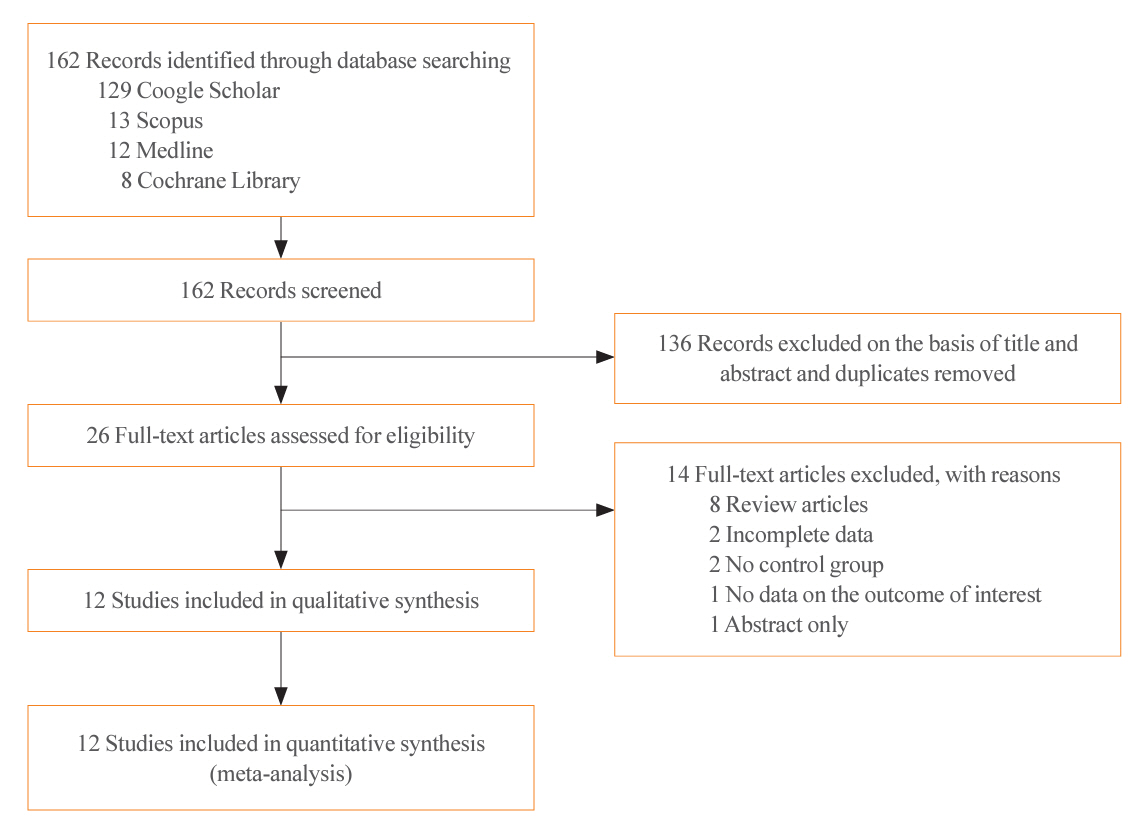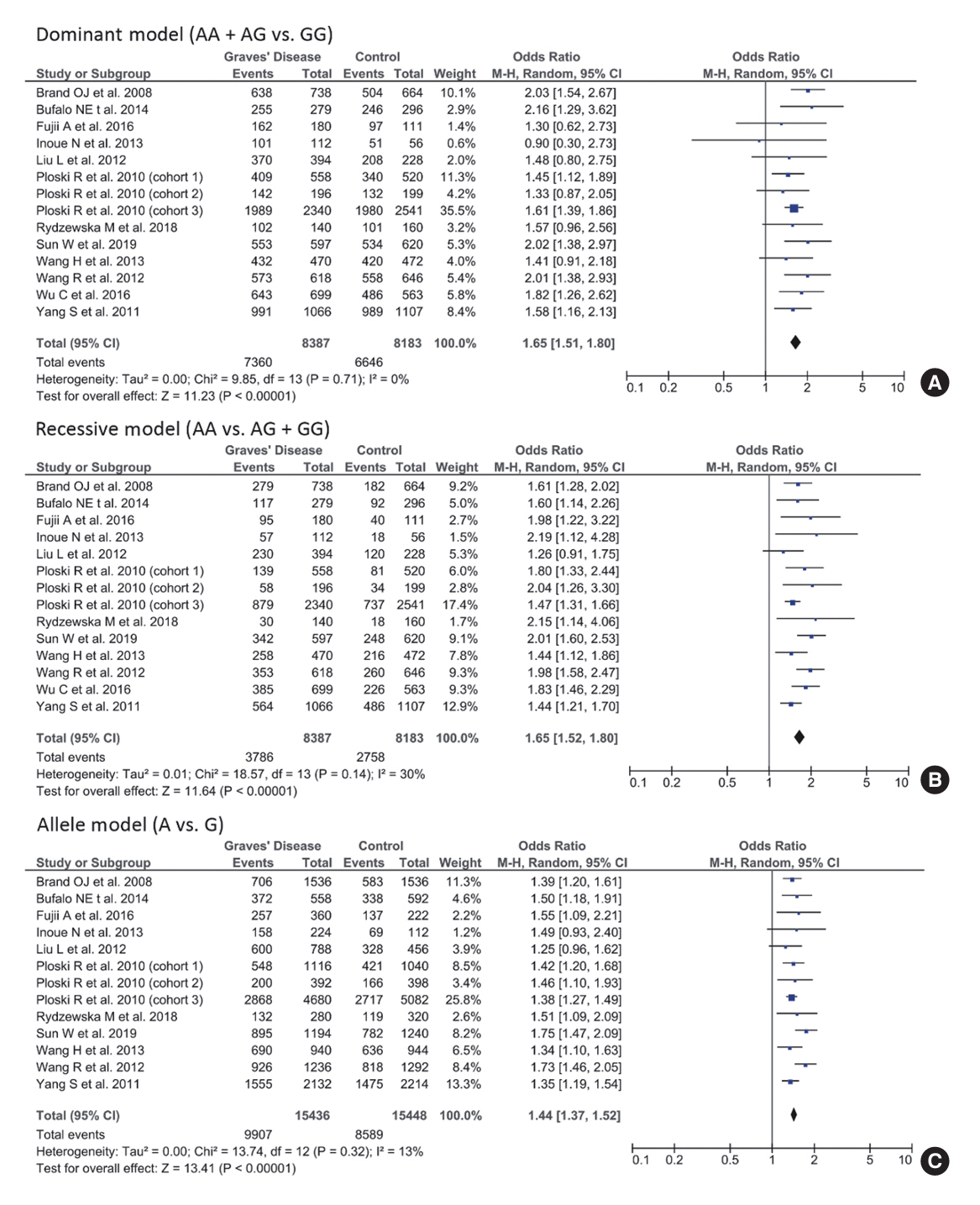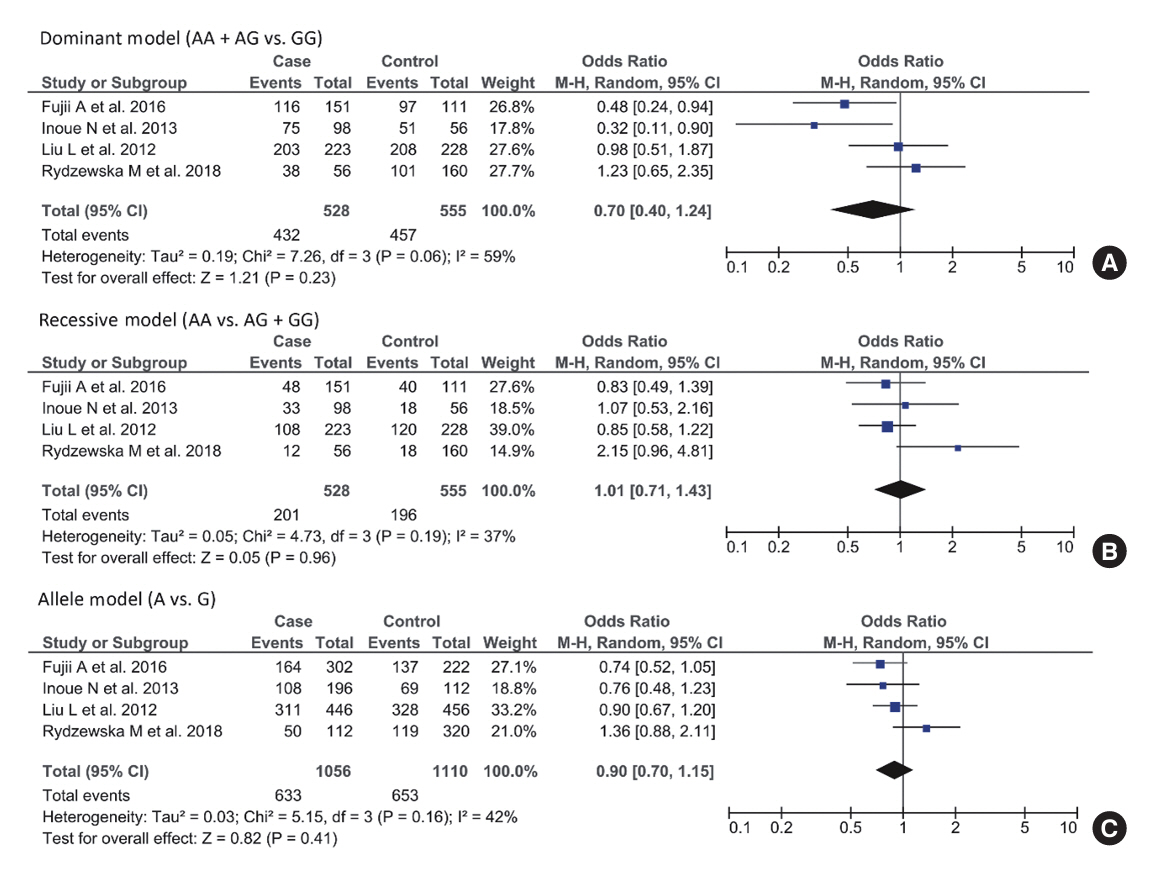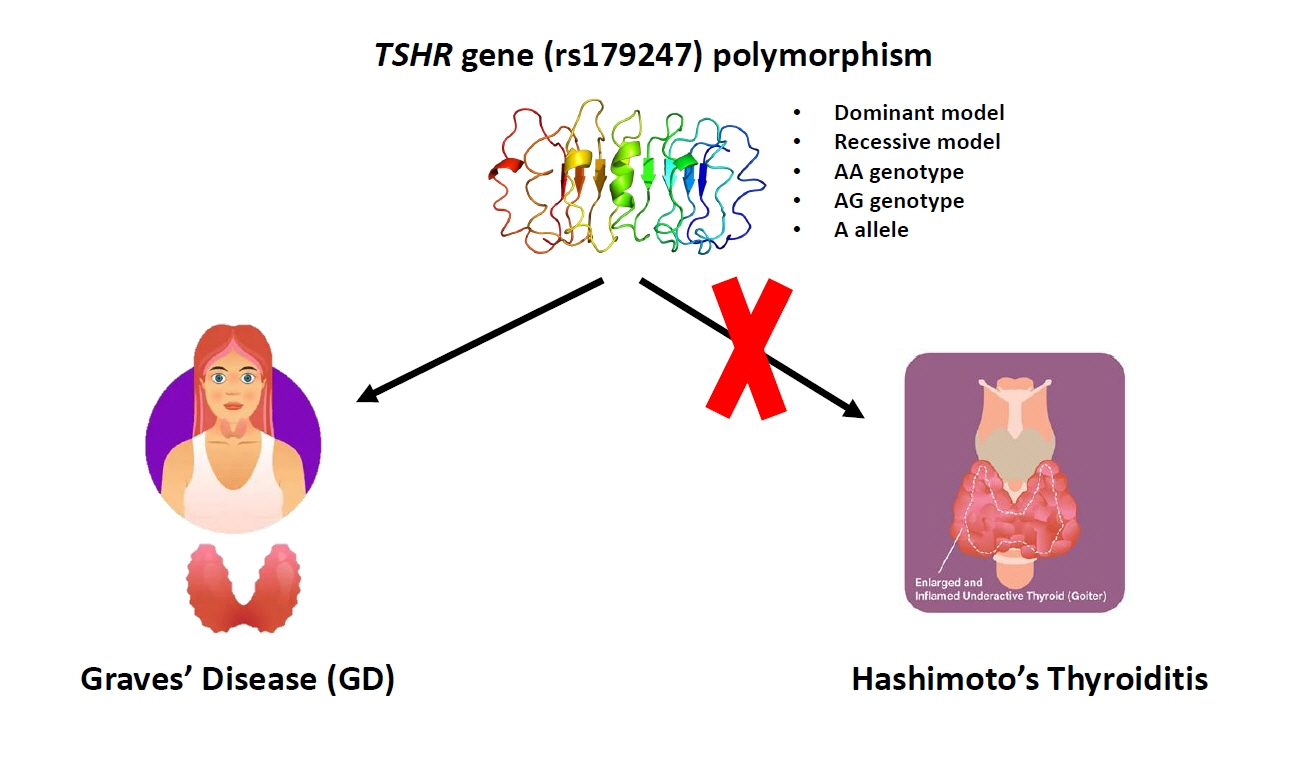Endocrinol Metab.
2024 Aug;39(4):603-614. 10.3803/EnM.2024.1987.
TSHR Gene (rs179247) Polymorphism and Susceptibility to Autoimmune Thyroid Disease: A Systematic Review and Meta-Analysis
- Affiliations
-
- 1Divisions of Endocrinology, Metabolism, and Diabetes, Thyroid Center, Department of Internal Medicine, Faculty of Medicine, Universitas Syiah Kuala (University Syiah Kuala), Banda Aceh, Indonesia
- 2Divisions of Endocrinology, Metabolism, and Diabetes, Department of Internal Medicine, Dr. Zainoel Abidin Hospital, Banda Aceh, Indonesia
- 3Innovation and Research Center of Endocrinology, Faculty of Medicine, Universitas Syiah Kuala (University Syiah Kuala), Banda Aceh, Indonesia
- 4Department of Internal Medicine, Faculty of Medicine, Pelita Harapan University, Tangerang, Indonesia
- KMID: 2558944
- DOI: http://doi.org/10.3803/EnM.2024.1987
Abstract
- Background
Both Graves’ disease (GD) and Hashimoto’s thyroiditis (HT) are classified as autoimmune thyroid diseases (AITDs). It has been hypothesized that changes in the thyroid-stimulating hormone receptor (TSHR) gene may contribute to the development of these conditions. This study aimed to analyze the correlation between the TSHR rs179247 gene polymorphism and susceptibility to AITD.
Methods
We conducted a thorough search of the Google Scholar, Scopus, Medline, and Cochrane Library databases up until March 2, 2024, utilizing a combination of relevant keywords. This review examines data on the association between TSHR rs179247 and susceptibility to AITD. Random-effect models were employed to assess the odds ratio (OR), and the findings are presented along with their respective 95% confidence intervals (CIs).
Results
The meta-analysis included 12 studies. All genetic models of the TSHR rs179247 gene polymorphism were associated with an increased risk of developing GD. Specifically, the associations were observed in the dominant model (OR, 1.65; P<0.00001), recessive model (OR, 1.65; P<0.00001), as well as for the AA genotype (OR, 2.09; P<0.00001), AG genotype (OR, 1.39; P<0.00001), and A allele (OR, 1.44; P<0.00001). Further regression analysis revealed that these associations were consistent regardless of the country of origin, sample size, age, and sex distribution. However, no association was found between TSHR rs179247 and the risk of HT across all genetic models.
Conclusion
This study suggests that the TSHR rs179247 gene polymorphism is associated with an increased risk of GD, but not with HT, and may therefore serve as a potential biomarker.
Keyword
Figure
Reference
-
1. Antonelli A, Ferrari SM, Corrado A, Di Domenicantonio A, Fallahi P. Autoimmune thyroid disorders. Autoimmun Rev. 2015; 14:174–80.
Article2. Davies TF, Andersen S, Latif R, Nagayama Y, Barbesino G, Brito M, et al. Graves’ disease. Nat Rev Dis Primers. 2020; 6:52.3. Ragusa F, Fallahi P, Elia G, Gonnella D, Paparo SR, Giusti C, et al. Hashimotos’ thyroiditis: epidemiology, pathogenesis, clinic and therapy. Best Pract Res Clin Endocrinol Metab. 2019; 33:101367.
Article4. Kahaly GJ. Management of Graves thyroidal and extrathyroidal disease: an update. J Clin Endocrinol Metab. 2020; 105:3704–20.
Article5. Okosieme OE, Taylor PN, Evans C, Thayer D, Chai A, Khan I, et al. Primary therapy of Graves’ disease and cardiovascular morbidity and mortality: a linked-record cohort study. Lancet Diabetes Endocrinol. 2019; 7:278–87.
Article6. Ahmed R, Al-Shaikh S, Akhtar M. Hashimoto thyroiditis: a century later. Adv Anat Pathol. 2012; 19:181–6.7. Brent GA. Environmental exposures and autoimmune thyroid disease. Thyroid. 2010; 20:755–61.8. Tomer Y. Mechanisms of autoimmune thyroid diseases: from genetics to epigenetics. Annu Rev Pathol. 2014; 9:147–56.
Article9. Chu X, Pan CM, Zhao SX, Liang J, Gao GQ, Zhang XM, et al. A genome-wide association study identifies two new risk loci for Graves’ disease. Nat Genet. 2011; 43:897–901.
Article10. Chen CR, Pichurin P, Nagayama Y, Latrofa F, Rapoport B, McLachlan SM. The thyrotropin receptor autoantigen in Graves disease is the culprit as well as the victim. J Clin Invest. 2003; 111:1897–904.
Article11. Dechairo BM, Zabaneh D, Collins J, Brand O, Dawson GJ, Green AP, et al. Association of the TSHR gene with Graves’ disease: the first disease specific locus. Eur J Hum Genet. 2005; 13:1223–30.
Article12. Page MJ, McKenzie JE, Bossuyt PM, Boutron I, Hoffmann TC, Mulrow CD, et al. The PRISMA 2020 statement: an updated guideline for reporting systematic reviews. BMJ. 2021; 372:n71.13. Stang A. Critical evaluation of the Newcastle-Ottawa scale for the assessment of the quality of nonrandomized studies in meta-analyses. Eur J Epidemiol. 2010; 25:603–5.
Article14. Higgins JP, Thompson SG, Deeks JJ, Altman DG. Measuring inconsistency in meta-analyses. BMJ. 2003; 327:557–60.
Article15. Brand OJ, Barrett JC, Simmonds MJ, Newby PR, McCabe CJ, Bruce CK, et al. Association of the thyroid stimulating hormone receptor gene (TSHR) with Graves’ disease. Hum Mol Genet. 2009; 18:1704–13.
Article16. Bufalo NE, Dos Santos RB, Marcello MA, Piai RP, Secolin R, Romaldini JH, et al. TSHR intronic polymorphisms (rs179247 and rs12885526) and their role in the susceptibility of the Brazilian population to Graves’ disease and Graves’ ophthalmopathy. J Endocrinol Invest. 2015; 38:555–61.
Article17. Fujii A, Inoue N, Watanabe M, Kawakami C, Hidaka Y, Hayashizaki Y, et al. TSHR gene polymorphisms in the enhancer regions are most strongly associated with the development of Graves’ disease, especially intractable disease, and of Hashimoto’s disease. Thyroid. 2017; 27:111–9.
Article18. Inoue N, Watanabe M, Katsumata Y, Hidaka Y, Iwatani Y. Different genotypes of a functional polymorphism of the TSHR gene are associated with the development and severity of Graves’ and Hashimoto’s diseases. Tissue Antigens. 2013; 82:288–90.
Article19. Liu L, Wu HQ, Wang Q, Zhu YF, Zhang W, Guan LJ, et al. Association between thyroid stimulating hormone receptor gene intron polymorphisms and autoimmune thyroid disease in a Chinese Han population. Endocr J. 2012; 59:717–23.
Article20. Ploski R, Brand OJ, Jurecka-Lubieniecka B, Franaszczyk M, Kula D, Krajewski P, et al. Thyroid stimulating hormone receptor (TSHR) intron 1 variants are major risk factors for Graves’ disease in three European Caucasian cohorts. PLoS One. 2010; 5:e15512.
Article21. Rydzewska M, Goralczyk A, Goscik J, Wawrusiewicz-Kurylonek N, Bossowska A, Kretowski A, et al. Analysis of chosen polymorphisms rs2476601 a/G - PTPN22, rs1990760 C/T - IFIH1, rs179247 a/G - TSHR in pathogenesis of autoimmune thyroid diseases in children. Autoimmunity. 2018; 51:183–90.
Article22. Sun W, Zhang X, Wu J, Zhao W, Zhao S, Li M. Correlation of TSHR and CTLA-4 single nucleotide polymorphisms with Graves disease. Int J Genomics. 2019; 2019:6982623.23. Wang H, Yang L, Jia Z, Wang B, Sun Y, Pan C, et al. Association of TSHR gene polymorphisms and haplotypes with Graves’ disease in Han population from coastal areas in Shandong province. Chin J Endocrinol Metab. 2013; 29:108–11.24. Wang R, Zhang X, Liu B, Yang J, Teng X, Sun W, et al. TSHR gene intron 1 region polymorphism and its relationship with Graves’ disease. Chin J Endocrinol Metab. 2012; 28:306–10.25. Wu C, Zhang X, Shun W, Wang R, Zhao W, Liu T. The relationship between thyroid stimulating hormone receptor gene intron 1 area polymorphism and Graves disease and its clinical manifestations in Han Chinese. J Bengbu Medl Coll. 2016; 41:1405–12. 1405-7, 12.26. Yang S, Liu W, Xue L, Zhao S, Pan C, Liang J, et al. Association of TSHR gene intron 1 polymorphisms with Graves’ disease. Chin J Endocrinol Metab. 2011; 27:478–81.27. Thornton A, Lee P. Publication bias in meta-analysis: its causes and consequences. J Clin Epidemiol. 2000; 53:207–16.28. Terrin N, Schmid CH, Lau J, Olkin I. Adjusting for publication bias in the presence of heterogeneity. Stat Med. 2003; 22:2113–26.
Article29. Marin-Sanchez A, Alvarez-Sierra D, Gonzalez O, LucasMartin A, Selles-Sanchez A, Rudilla F, et al. Regulation of TSHR expression in the thyroid and thymus may contribute to TSHR tolerance failure in Graves’ disease patients via two distinct mechanisms. Front Immunol. 2019; 10:1695.30. McLachlan SM, Rapoport B. Breaking tolerance to thyroid antigens: changing concepts in thyroid autoimmunity. Endocr Rev. 2014; 35:59–105.
Article31. Pujol-Borrell R, Alvarez-Sierra D, Jaraquemada D, Marin-Sanchez A, Colobran R. Central tolerance mechanisms to TSHR in Graves’ disease: contributions to understand the genetic association. Horm Metab Res. 2018; 50:863–70.
Article32. Colobran R, Armengol Mdel P, Faner R, Gartner M, Tykocinski LO, Lucas A, et al. Association of an SNP with intrathymic transcription of TSHR and Graves’ disease: a role for defective thymic tolerance. Hum Mol Genet. 2011; 20:3415–23.
Article33. Xiong H, Wu M, Yi H, Wang X, Wang Q, Nadirshina S, et al. Genetic associations of the thyroid stimulating hormone receptor gene with Graves diseases and Graves ophthalmopathy: a meta-analysis. Sci Rep. 2016; 6:30356.
Article
- Full Text Links
- Actions
-
Cited
- CITED
-
- Close
- Share
- Similar articles
-
- Tumor necrosis factor-α (TNF-α) polymorphism (-308, G/A) and autoimmune diseases: an updated meta-analysis
- Hyperthyroidism Caused by a Mutation in the Thyrotropin Receptor Gene in Two Brothers
- Meta-Analysis of Genetic Association Studies
- An Introduction of the Systematic Review and Meta-Analysis
- Significance of Lymphovascular Invasion as a Prognostic Factor in Patients with Papillary Thyroid Cancer: a Systematic Review and Meta-Analysis





